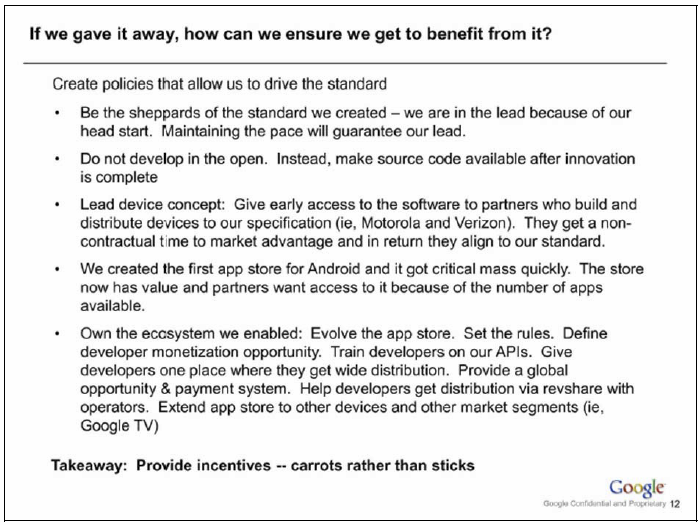Latest filings in Oracle patent case spell trouble for Google

The latest documents filed in Oracle’s copyright and patent lawsuit against Google contain more than a dozen chunks of information that Google’s lawyers fought to keep confidential. They lost, and the result is some embarrassing and possibly damaging disclosures.
Two documents filed yesterday were made public today and first reported by Florian Mueller on his FOSS Patents blog.
The most interesting revelations are in a 290-page report from Oracle’s expert witness, John C. Mitchell, Ph.D. Dr. Mitchell, a Professor of Computer Science at Stanford University and a heavyweight in programming circles whose work is incorporated in both the Java and .NET programming languages, was hired by Oracle (at a rate of $800 per hour) to testify on Google’s alleged infringement of Oracle’s copyrights and patents on Java, which it acquired when it purchased Sun in 2009.
Oracle’s most damning accusation is that Google directly copied Java source code for use in Android. The new documents directly address those claims.
[Confused by the claims and counter-claims in this case? See my follow-up: The real history of Java and Android, as told by Google]
A total of 12 sections in Prof. Mitchell’s report were marked as GOOGLE ATTORNEYS’ EYES ONLY or GOOGLE CONFIDENTIAL. Here’s a sampling of what Google wanted to redact:
- “[A]ccording to Google’s records, a number of Google employees and contractors who worked on Android previously had access to Sun’s Java code.” One, Joshua Bloch, “was an architect of the Java platform at Sun [and] now works for Google … his name appears in the source code of several Java library files.”
- “When asked about the significance of copyright protection for the specifications he wrote at Sun, Bloch replied: ‘[I]f someone else were to take this prose and publish it for profit, Sun would probably be upset, and with good reason.’”
- Google exec Patrick Brady, in a June 2009 document titled “Android Strategy and Partnerships Overview,” is quoted as saying “Android isn’t a new product to monetize; it’s a new medium to drive monetization on existing products.”
- In a deposition, Bloch was asked whether he accessed Sun code while working at Google. “I don’t have a recollection, but I’m perfectly willing to believe that I did. You know, I think the similarity of the signature, the fact that, you know, the three arguments are in the same order and have the same name, you know, is a strong indication that it is likely that I did.”
One lengthy five page section of the expert witness report, marked as GOOGLE ATTORNEYS’ EYES ONLY, contains a slide from an internal Google presentation titled Android OC Quarterly Review – Q4 2010, by Andy Rubin et al. (Rubin runs the Android division at Google):
The section contains multiple quotes from confidential Google emails dating back as far as 2007 and documenting Google’s intention to create a full-fledged ecosystem based on the Java programming language. But Google has to be embarrassed by the second and third bullet points in that slide. “Do not develop in the open” contradicts Google’s oft-stated description of the platform. This, for example, was the company’s public statement earlier today in response to to an antitrust raid in South Korea:
Android is an open platform, and carrier and OEM partners are free to decide which applications and services to include on their Android phones.
Likewise, the explicit statement that Google gives “early access to the [Android] software to partners who build and distribute devices to our specification” is potentially troubling. The quid pro quo? “They get a non-contractual time to market advantage and in return they align to our standard.”
Play by Google's rules, and you get an advantage in the market. Try to innovate, and you'll start the race in second place.
The mention of Motorola is especially troubling given Google's plans to buy the handset maker. Google’s previous reference devices, the Nexus One and Nexus S, were from HTC and Samsung, respectively.
In a separate lawsuit involving Motorola and Microsoft, Google stated last month that Android contains “highly proprietary source code that Google does not even share with its partners, such as Motorola.” The new admission that Motorola has "early access" is certain to be disturbing to other OEM partners.
The second document, also filed yesterday, contains 13 exhibits—email messages and a slide deck—dating back to 2005 and early 2006. They trace the history of Google’s negotiations with Sun over open-sourcing the Java code for use in Android. The final exhibit is an e-mail from Andy Rubin to Google founders Sergey Brin and Larry Page and Senior VP Alan Eustace:
I’ve been working with Sun and pushing them to open source Java … [T]hey have conceptually agreed to open java and additionally they desire to broaden the relationship and become a customer of the Android ecosystem and Google. Their desire is to create a “distribution” of the Android system ala Redhat. … This is a huge step for Sun, and very important for Android and Google.
That agreement never happened, of course, and Oracle argues that the Java code was so important to Google that they simply copied it.
As this case unfolds, I am continually reminded of another company that dominated its industry until hubris, as documented in internal emails and other documents, brought it down to earth. Google’s lawyers and executives need to take a weekend and study the history of U.S. v. Microsoft to learn what not to do.
